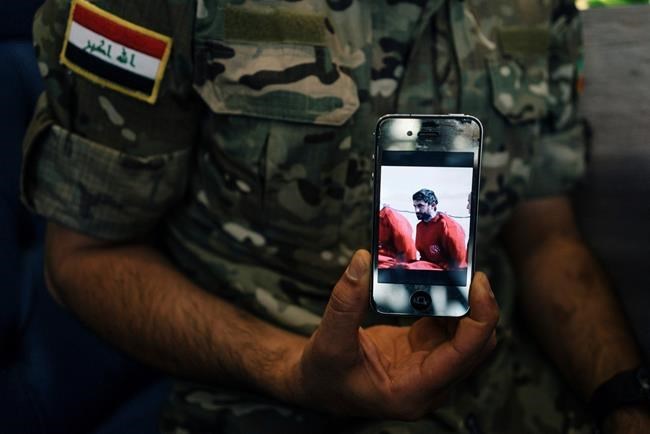
FILE - In this Aug. 10, 2016 file photo, Iraqi Army Cpl. Saif holds a phone displaying a screenshot from a video released by the Islamic State group that shows his brother, in Irbil, Iraq. He claims the video showed his brother's execution. Just over two years ago, Saif was holed up in a corner of Mosul’s Nineveh hotel as he first began hearing rumors that his senior officers were fleeing the militant group’s advance. Now, he’s among the Iraqi forces beginning a massive operation to retake the country’s second city from the militants.(AP Photo/Alice Martins, File)
October 19, 2016 - 12:53 PM
QAYARA AIR BASE, Iraq - For Saif, an Iraqi army corporal, the battle for Mosul is intensely personal. Over the course of two years of Islamic State rule, the extremists destroyed his home, arrested his father, killed his brother and forced his fiancee into a marriage with an IS fighter.
Now he's looking for revenge.
"I used to be a normal person. My dream was just to save enough money to build a house so I could get married," the 30-year-old soldier said, nervously fiddling with his cigarette.
All together seven members of his family were killed by the extremists, he said, giving only his first name because he didn't have permission from commanding officers to talk to the media. He only found out about their deaths when he saw a video the militant group released of their killings.
"I know the man who killed my father and the man who killed my brother," Saif said, flipping through screen grabs from the video he keeps on his phone. "And I know the woman who informed on them. She was our neighbour."
Younis Atiya, a Sunni tribal militia fighter, also frames the operation to retake Mosul as a chance at personal vengeance.
Atiya's village on the edge of Nineveh province was retaken from IS earlier this year. Standing outside the building that was once his home he pointed to the spot outside the garden gate where he watched IS fighters abduct his father.
"They drove up to the house in a pickup truck. We saw them and tried to run away but it was too late," he said. After holding his father for three days, IS killed him and dumped his body. Atiya's relatives had to steal the body from the town morgue in order to give him a proper burial.
"I want to liberate Mosul to save people from the fate that my family suffered," the 30-year-old fighter said. "I spent days here afraid of IS and I don't want anyone else to be afraid. And I want to take revenge for my father."
When Mosul fell in the summer of 2014, Saif was among the troops deployed to defend it. He recalled being holed up in a corner of the city's Nineveh Hotel when he first began hearing rumours that his senior officers were giving up the fight. Within 24 hours, thousands of Iraqi troops and policemen stationed in Mosul discarded their uniforms, threw down their weapons and fled the city.
The moment marked a humiliating defeat for the country's military, with catastrophic consequences. IS militants went on to overrun the city of Tikrit just north of Baghdad and began to advance on the Iraqi capital, plunging the country into the deepest security and political crisis since the U.S.-led invasion in 2003.
On Monday, Iraqi Prime Minister Haider Al-Abadi announced the start of the massive operation to retake Mosul, an offensive involving some 30,000 troops — a force that includes not only Iraq's conventional army but an array of other armed groups, including Shiite militias, Iraqi Kurdish fighters and Sunni tribal fighters like Atiya.
While they are all working under the same operational banner in the battle for Mosul, Iraq lacks a political plan for how the country will be governed after IS and Iraqi officials have warned this could lead to ongoing violence in the form of revenge attacks or clashes between rival armed groups who no longer have a common enemy.
As he awaits orders to move into Mosul from his deployment at Qayara Air Base, 45 miles (70 kilometres) to the south, Saif said he was relieved the operation to retake the city has begun, but said he fears the situation will only get worse after the fight.
"First of all there will be revenge killings," he said, "which will just lead to more and more revenge and any enemies that we have now, will be doubled or tripled."
Illustrating his point, Saif said once Iraqi forces push into Mosul, he intends to go directly to his neighbourhood to kill those responsible for the deaths of his relatives.
"I have my own sources inside Mosul who tell me who is Daesh and who isn't," he said, using the Arabic acronym for IS. "My commander knows my plans and he has agreed to let me go."
___
Associated Press writers Balint Szlanko and Salar Salim in Makhmour, Iraq, contributed to this report.
News from © The Associated Press, 2016